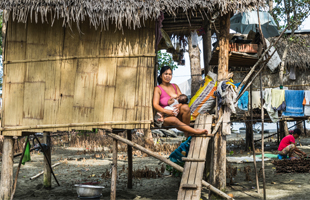
On World Breastfeeding Week which is celebrated from 1 to 7 August, the World Health Organization in the Western Pacific recognizes the right of all women to breastfeed their children and advocates for women to be able to breastfeed whenever and wherever it is necessary. The theme “supporting moms to breastfeed anytime, anywhere” calls for a shift in attitudes to build breastfeeding-friendly societies in order to optimize the development, health and well-being of future generations.
Mothers today face a multitude of barriers that hinder their ability to carry out safe and supported breastfeeding. The urbanization and industrialization has resulted in a growing number of women with mixed employment and caregiving roles. Many workplaces lack adequate spaces for mothers to breastfeed, and of the 17 countries that offer paid maternity leave, only two meet the minimum duration of at least 14 weeks recommended by the International Labour Organization Maternity Protection Convention of 2000. Additionally, the ability to breastfeed “on the go” to meet feeding needs of babies is largely challenged by lack of suitable public spaces and disparaging community attitudes.
"All governments should uphold the right of every mother to breastfeed and of every child to be breastfed by strengthening workplace legislation and regulation,” said Dr Shin Young-soo, WHO Regional Director for the Western Pacific. “They should ensure that health systems and workers support the initiation and maintenance of breastfeeding, and engage communities to provide peer support."
Breastfeeding is the ideal source of sustenance for infants, providing the complete nutritional and hydration requirements that a child needs in the first six months of life. In order to promote optimal health and prevent premature deaths of children, mothers should exclusively breastfeed for the first six months of life, and continue to provide breastmilk, in addition to complementary foods, up to or beyond two years. This involves the provision of breastmilk day and night, when the child wants.
Despite these recommendations, evidence shows a vast disconnect between ideal breastfeeding requirements and breastfeeding practices that occur in the Western Pacific Region.
Thirty-one per cent of babies in the Region are exclusively breastfed up to six months of age and only one in four babies continues to receive breastmilk up to their second birthday, according to recent studies. As a result, the majority of children born in the Western Pacific Region today start life with an increased risk of disease and long term morbidity.
“Breastfeeding saves lives,” said Dr Shin. “Not only does it nourish children, but it protects them from infectious diseases and other diseases such as asthma, hypertension, cancer and cardiovascular diseases over the long term.”
To enable mothers to establish and sustain exclusive breastfeeding for six months, WHO recommends:
- initiation of breastfeeding within the first hour of life;
- exclusive breastfeeding – meaning the infant only receives breast milk and nothing else during the first six months of life;
- breastfeeding on demand – that is breastfeeding as often as the child wants, day and night; and
- no use of bottles, teats or pacifiers.
In 2012, at the World Health Assembly, WHO Member States committed to increasing the rate of exclusive breastfeeding in the first six months of life to 50% by the year 2025. However, addressing the low rates of breastfeeding in the Western Pacific Region requires more than just action from policy-makers and governments. With the constant change in the environments and situations in which we live and work, societal attitudes need to adapt to influence a world where mothers are able to breastfeed anytime, anywhere.
